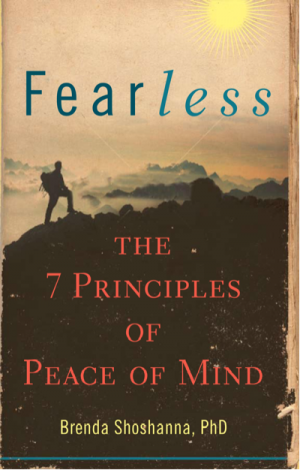Fearless: The 7 Principles of Peace of Mind

A healthy dose of fear is necessary at times, but I often wonder how much further ahead humanity would be if it wasn’t bound by insecurity. Fear-based emotions like jealously, aggression and insecurity have wreaked havoc on our collective development, leading to war, oppression and famine.
Oftentimes we are hindered by the “worst case scenarios” that we dream up in our minds. This, according to Brenda Shoshanna, is no way to live.
In her book Fearless: The 7 Principles of Peace of Mind, Shoshanna examines the fear-based psyche and offers seven steps for eliminating negativity. Shoshanna believes that understanding our personal and professional fears will lead to a greater self-awareness, that negativity cannot be fought with negativity and that fear dissipates in the presence of love.
Her assertion that love should be embraced and fear rejected is simplistic. A closer inspection however does reveal complexities. How exactly does one “let go” of paralyzing phobias? How does one “dissolve” fear?
Shoshanna attempts to lead her readers through this mental quandary with the help of Buddhist teachings. She believes that enlightenment can only be achieved by embracing discomfort. Fear is, after all, nothing more than a mental construct, bred into existence by unrealistic expectations. Understanding the ebb and flow of life, embracing true natures, and turning attentions towards positive things will, according to Shoshanna, lead to a more purposeful existence. Shoshanna’s seven principles appear to be based in common sense rather than any form of scientific or sociological study. New-age clichés are prevalent throughout. She urges her readers to “cultivate the miracle of love”, to “embrace” their “perfect nature” and to “find the precious jewels” in their lives.
I suspect that Fearless will be popular among self-help enthusiasts. Those that don’t subscribe to new age mentalities, however, will find nothing new here. Despite being filled with Buddhist fables and real-life anecdotes, the book is merely an ad naseum repetition of the notion that life is too short to be bound by fear.
That said, there is a place for this book. The true path to enlightenment is, after all, an ongoing journey. Books like Fearless are useful in that they help maintain focus. Shoshanna has included a “Workshop” at the end of the book that demonstrates how the seven principles can be incorporated into daily life. In my opinion, this is the most useful section of Fearless as it allows the reader time for introspection.
I wouldn’t classify this book as a challenging read but Fearless does inspire meditation and personal reflection, important practices that are absent from the average daily routine. While I could relay criticism about Shoshanna’s writing style and the grammatical layout of the book (she really does love her commas), I’ll choose instead to focus on the fact that Fearless relays an important message. It is for that reason that I will, reluctantly, recommend the book.